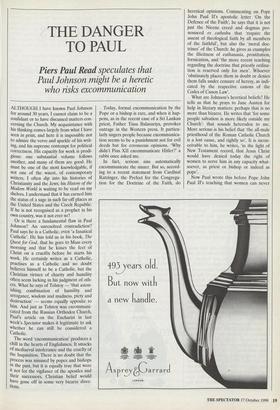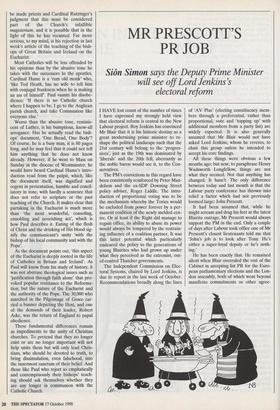THE DANGER TO PAUL
Piers Paul Read speculates that Paul Johnson might be a heretic who risks excommunication ALTHOUGH I have known Paul Johnson for around 30 years, I cannot claim to be a confidant or to have discussed matters con- cerning the Church. My acquaintance with his thinking comes largely from what I have seen in print, and here it is impossible not to admire the verve and sparkle of his writ- ing, and his supreme contempt for political correctness. His capacity for work is prodi- gious: one substantial volume follows another, and many of them are good. He must be one of the most knowledgable, if not one of the wisest, of contemporary writers. I often dip into his histories of Christianity and the Jews; his History of the Modem World is waiting to be read on my shelves. I understand that it has earned him the status of a sage in such far-off places as the United States and the Czech Republic. If he is not recognised as a prophet in his own country, was it not ever so?
Or is there a fundamental flaw in Paul Johnson? An unresolved contradiction? Paul says he is a Catholic, even 'a fanatical Catholic'. He has told us in his book, The Quest for God, that he goes to Mass every morning and that he kisses the feet of Christ on a crucifix before he starts his work. He certainly writes as a Catholic, practises as a Catholic and no doubt believes himself to be a Catholic, but the Christian virtues of charity and humility often seem lacking in his judgment of oth- ers. What he says of Tolstoy — 'that aston- ishing combination of humility and arrogance, wisdom and madness, piety and destruction' — seems equally apposite to him. And just as Tolstoy was excommuni- cated from the Russian Orthodox Church, Paul's article on the Eucharist in last week's Spectator makes it legitimate to ask whether he can still be considered a Catholic.
The word 'excommunication' produces a chill in the hearts of Englishmen. It smacks of mediaeval intolerance and the cruelty of the Inquisition. There is no doubt that the process was misused by popes and bishops in the past, but it is equally true that were It not for the vigilance of the apostles and their successors, Christian belief would have gone off in some very bizarre direc- tions. Today, formal excommunication by the Pope or a bishop is rare, and when it hap- pens, as in the recent case of a Sri Lankan priest, Father Tissa Balasuriya, provokes outrage in the Western press. It particu- larly angers people because excommunica- tion seems to be a punishment not for evil deeds but for erroneous opinions. 'Why didn't Pius XII excommunicate Hitler?' a rabbi once asked me.
In fact, serious sins automatically excommunicate the sinner. But so, accord- ing to a recent statement from Cardinal Ratzinger, the Prefect for the Congrega- tion for the Doctrine of the Faith, do heretical opinions. Commenting on Pope John Paul II's apostolic letter 'On the Defence of the Faith', he says that it is not just the Nicene creed and dogmas pro- nounced cc cathedra that 'require the assent of theological faith by all members of the faithful', but also the 'moral doc- trines' of the Church: he gives as examples the illicitness of euthanasia, prostitution, fornication, and 'the more recent teaching regarding the doctrine that priestly ordina- tion is reserved only for men'. Whoever `obstinately places them in doubt or denies them falls under censure of heresy, as indi- cated by the respective canons of the Codes of Canon Law'.
What are Johnson's heretical beliefs? He tells us that he prays to Jane Austen for help in literary matters: perhaps that is no more than bizarre. He writes that 'for some people salvation is more likely outside my Church': that sounds heterodox to me. More serious is his belief that 'the all-male priesthood of the Roman Catholic Church is a lost cause, and rightly so'. It is incon- ceivable to him, he writes, 'in the light of New Testament record, that Jesus Christ would have denied today the right of women to serve him in any capacity what- soever, as priest or bishop or indeed as pope'.
Now Paul wrote this before Pope John Paul H's teaching that women can never be made priests and Cardinal Ratzinger's judgment that this must be considered part of the Church's infallible magisterium, and it is possible that in the light of this he has recanted. Far more serious, to my mind, is his rejection in last week's article of the teaching of the bish- ops of Great Britain and Ireland on the Eucharist.
Most Catholics will be less offended by his opinions than by the abusive tone he takes with the successors to the apostles. Cardinal Hume is a 'rum old monk' who, `like Ted Heath, has no wife to tell him with conjugal frankness when he is making an ass of himself'. Paul vaunts his disobe- dience: 'If there is no Catholic church where I happen to be, I go to the Anglican parish church, and take Communion like everyone else.'
Worse than the abusive tone, reminis- cent of Luther, is his bumptious, know-all arrogance. Has he actually read the bish- ops' document, 'One Bread, One Body'? Of course, he is a busy man, it is 80 pages long, and he may feel that it could not tell him anything that he does not know already. However, if he went to Mass on Sunday in the diocese of Westminster, he would have heard Cardinal Hume's intro- duction read from the pulpit, which, like the document itself, was dignified and cogent in presentation, humble and concil- iatory in tone, with hardly a sentence that does not refer to scripture or the past teaching of the Church. It makes clear that partaking in the Eucharist is much more than `the most wonderful, consoling, ennobling and nourishing act', which is how Paul describes it. Eating of the flesh of Christ and the drinking of His blood sig- nify the communicant's unity 'with the bishop of his local community and with the Pope'.
As the document points out, 'this aspect of the Eucharist is deeply rooted in the life of Catholics in Britain and Ireland'. As Paul will know from his study of history, it was not abstruse theological issues such as `justification through faith alone' that pro- voked popular resistance to the Reforma- tion, but the nature of the Eucharist and the authority of the Pope. The 30,000 who marched in the Pilgrimage of Grace car- ried a banner depicting the Host, and one of the demands of their leader, Robert Aske, was the return of England to papal obedience.
These fundamental differences remain as impediments to the unity of Christian churches. To pretend that they no longer exist or are no longer important will not help unite them but will only lead Chris- tians, who should be devoted to truth, to bring dissimulation, even falsehood, into the innermost sanctum of their belief. And those like Paul who reject so emphatically and contemptuously their bishops' teach- ing should ask themselves whether they are any longer in communion with the Catholic Church.











































































 Previous page
Previous page